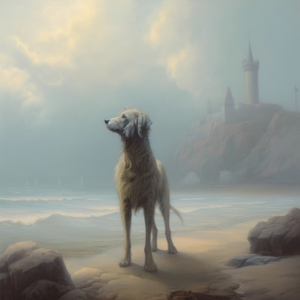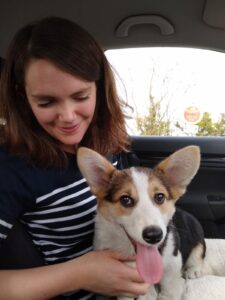by Katie McIvor

The dog bus makes its rounds once a year through the lands of myth. Starting in the north, in the early morning – so early it’s barely yet light – the bus rolls up to a middle-of-nowhere sign by the roadside. In the misty grey dawn, in the shadow of the hill which mounts into blackness above, the Cù Sìth is waiting. Its haunches twitch on the wet grass.
As the bus approaches, the Cù Sìth emits three sharp, haunting barks, which for miles around cause children to wake from their sleep and huddle in their blankets, sheltering their heads beneath the safety of pillows.
The door wheezes open. Onto the first step come the Cù Sìth’s paws. The smell of stagnant water precedes it. Up close, the dog’s fur is a dark, bog-like green, the colours of the endless moor. Its eyes burn with a spectral gleam. The driver nods hello, and with a whine the Cù Sìth bumps its nose up into his hand. Its claws click on the vinyl as it makes its way down the aisle.
The bus drives on. Headlights smothered by the moorland fog, it creeps south. The grey city grows around it. In the kirkyard, its tiny shape lost in the deep, gravestone gloom, a terrier wags its tail. When the doors open, it springs up into the bus and leaps into the driver’s arms, licking his face with a small, ghostlike tongue.
“Away with you, Bobby,” says the driver, but his eyes are smiling.
Bobby avoids the steaming, bull-sized bulk of the Cù Sìth. He sits up front, just behind the driver, his tiny paws against the window.
They continue south. On a lonely road in Northumberland, a huge black creature waits with its front leg extended: the Gytrash, foe of solitary travellers. Heading westwards and then down the M6, they stop to collect the phantom Moddey Dhoo, fresh off the ferry from Douglas. The new passengers sit aloof from one another, each taking up a double seat, curled like enormous, matted cats. Bobby’s wary eyes flit between them.
Wales is slate-grey with rain. Halfway down the tree-lined slope of the Nant y Garth Pass, a shuddering howl halts the bus, and the Gwyllgi, the Cŵn Annwn, dog of the Otherworld, comes aboard. The driver chucks it absentmindedly under the chin. In its wake, a small, bouncing shape appears: a corgi, with her fairy rider perched side-saddle. The fairy flies up to hand her fare to the driver, but he knows better than to accept coin from the fair folk.
Back into England, and on through miles of dull motorway. They stop at a service station somewhere near Wolverhampton. At this strange, perpetual dawn hour, only red-eyed lorry drivers peer from their curtained cabs, and they think nothing of the procession of phantom hounds which crosses the tarmac to pee on the litter-flecked grass and drink, one by one, from the dirty metal water bowl.
The next stop is a cold, dark little church where the wind shrieks through the branches of yew trees. The church grim trots out, stretching his hind legs. He greets the Gytrash politely, nose to nose, for they are old comrades. The others he ignores.
Black Shuck has roamed to the very edge of his eastern domain to catch the bus. Giant head raised, steam spouting from his nostrils in the cold, deathly air, he climbs aboard. The driver feels a chill pass over him, as though of footsteps over his grave, but he pats Black Shuck on the head all the same, though he has to reach up from his chair to do it. Black Shuck’s glowing eyes soften to a pale, almost pleasant yellow beneath the strip lights. He takes his seat across the aisle from the Cù Sìth, whose bog-damp fur gives off an odour that is comforting to him, reminiscent of the Norfolk Broads.
The streets of London are ghostly at this hour, abandoned even by the drunks. At 31 Kensington Park Gardens, a large Newfoundland waits patiently by the gate, her three floating charges in tow. The children whoop with excitement as they board, causing the corgi to leap up with an ear-splitting bark and bound into the air, trying to nip their ankles. The fairy, dislodged from her nap, yanks on the corgi’s reins, while Nana herds the children back to the front of the bus and sits them down in an orderly manner.
Moving through the south-west, they collect the Devil’s Dandy Dogs, fresh from a night-time hunt, and the cowed, scavenging mutts of the Camelot kitchens. Then the bus, now nearly full, jolts up onto Dartmoor, where awaits the most fearsome hound of all: the slavering beast of the Grimpen Mire. Its great jaws drool misty vapour as it slinks up the aisle of the bus.
They descend towards the coast. The driver knows the place: the secret beach where, once a year, the dogs of myth take their outing. Despite the long drive, dawn has just broken by the time they arrive. The beach is long, perfect, empty of the picnickers and holidaymakers who will soon swarm its picture-postcard dunes. They have the place to themselves.
The interior of the bus trembles with energy. The dogs sit poised and upright, only the intense wagging of tails betraying their eagerness. When the doors slide open, the excitable corgi is the first to tumble down the steps, her fairy rider cursing and hauling ineffectively at the reins. The Camelot mutts are right behind her. They writhe and trip over one another in a tangle of hairy legs, while the Devil’s Dandy Dogs snap at their tails. Next come the Gytrash and the church grim, at a stately pace, shoulder to shoulder. Black Shuck and the Cù Sìth follow. The Gwyllgi and the Moddey Dhoo skulk after them, glancing over their shoulders at the Dartmoor Hound, which paces lone and panther-like from the back of the bus. Lastly, Nana shepherds her three children down the steps, and only Bobby is left, polite and patient as always, waiting for the driver. The old man and his old dog walk the path to the beach side by side.
The sand shines primrose-yellow in the sunlight. Deep-clawed prints race to the shore, where a cacophony of splashing, leaping, and barking unfolds in the shallows. The Camelot hounds coat their skinny bodies in sand, eyes rolling with delight, while the Devil’s Dandy Dogs take off as one in pursuit of a seagull. The corgi is a frantic, cannonballing blur, her thick fur soaked, her fairy rider laughing through the saltwater spray. Even the deathly dogs, the portents of the underworld, frolic for all they are worth in the sea and pass a red rubber ball from jaw to dripping jaw. The Dartmoor Hound, overcome with sudden excitement, takes off and races its own long shadow from one end of the beach to the other.
On the dunes, Bobby and his owner sit and watch the sunrise. They are quiet with each other, after all these years. The old man rests his hand on Bobby’s wiry fur. The soft sand feels kind beneath their stiff limbs. A little way below them, her tongue lolling contentedly, Nana oversees the construction of a sandcastle.
The sun begins to lift into the sky as the day draws on, and the shadows shorten. The Moddey Dhoo solidifies in the brightness, no longer ethereal, nothing but a large spaniel splashing delightedly in the surf. Black Shuck, with his wolfish fur slicked into spikes, could be any oversized black dog, the Gwyllgi any capering mastiff. Even the Cù Sìth, although the height of a horse and the colour of submerged moss, might be mistaken for a family pet as it barks and frisks on the wet sand. Duties forgotten, for this one day of the year, they are free.
As the holidaymakers begin to appear over the crest of the dunes, the bus driver whistles to his pack. One after another, the dogs of legend shake water from their coats and trot up the beach towards him, panting and laughing. The corgi plants sopping paws on the driver’s knees, and the Dartmoor Hound, in a fit of exuberance, surges up to lick his weathered cheek. But to old Bobby, who waited for fourteen years by a grave in Greyfriars Kirkyard, the scene is already a dream. He lies fast asleep and smiling in his master’s arms as the mythical pack piles back onto the bus.
* * *
 About the Author
About the Author
Katie McIvor is a Scottish writer and library assistant. She studied at the University of Cambridge and now lives in England with her husband and two dogs. Her short fiction has appeared or is forthcoming in The Deadlands, Uncharted, Interzone, and the Bram Stoker Award-nominated anthology Mother: Tales of Love and Terror, and her three-story collection is out now with Ram Eye Press. You can find her on Twitter at @_McKatie_ or on her website at https://katiemcivor.com/.